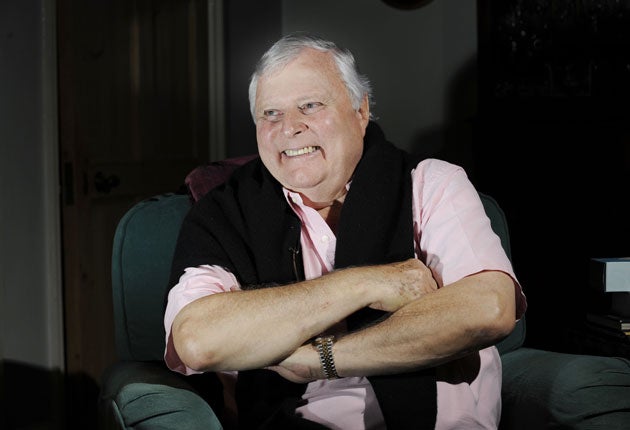Brian Viner: He divides opinion but Alliss brings history to glorious game after 50 years on the mic
The Last Word

Few television commentators divide armchair viewers quite like Peter Alliss, the octogenarian who is now more than a decade older, and possibly even better upholstered, than his dear old commentary-box mentor Henry Longhurst was when he finally popped his brogues.
Longhurst, whose 1971 autobiography My Life and Soft Times, though long out of print, remains one of golf's literary gems, didn't quite make his four-score years and 10, and I don't suppose anyone was rushing to save his liver for transplant purposes.
Henry didn't acquire that WC Fields nose of his without a fondness for a tipple, indeed 20 years or so ago I was treated to the story of a transatlantic crossing he once made, during which all the liner's clocks were automatically wound forward as it entered a new time zone.
Longhurst was by then lying on his bed after a few too many at the bar, and when he saw the hands of the clock whizzing round, felt certain that alcoholic demons wereresponsible. "I always thought I'd get 'em," he grunted, "and by Christ I've got 'em now."
The man who told me that story was Percy Belgrave "Laddie" Lucas CBE DSO DFC, also now long gone, although he crammed far too much into his long life ever to be forgotten. He was an RAF war hero, a Tory MP, brother-in-law to Douglas Bader and a left-handed golfer good enough to win the 1933 British Boys Championship, and later to captain the 1949 Walker Cup team.
I thought of him on Thursday, while standing near the 14th tee at Royal St George's, enjoying the bizarre spectacle of Rory McIlroy teeing off in the foreground, and an enthusiastic hacker teeing off in the background, just over the fence at Prince's Golf Club.
Lucas was born in the original clubhouse at Prince's, where hisfather was secretary, and somewhere on the links there is a plaque marking the spot where, during the war, using his intimate knowledge of the course, he crash-landed his crippled Spitfire following a bit of bother over northern France.
All of which has steered me well away from Peter Alliss, whose 50 years in the commentary box are deemed by some golf fans to be worth popping a champagne cork, while others wouldn't toast the old boy with flat Tizer, unless it was to mark the termination of his BBC contract. For what it's worth, I belong unapologetically to his fan club. I could live without the birthday wishes to his old pal Wing-Commander Winky Warburton but I enjoy his conversational style, and the fact that he still understands that pictures tell a story, and don't need the kind of incessant interpretation offered by some of his colleagues, above all the verbally incontinent Wayne Grady.
Most of all, though, I value the history and the lineage that Alliss represents. Heaven knows, a sport in which a 20-year-old amateur can rise to the fore, as Tom Lewis has at Royal St George's, should not dwell on its past at the expense of its future, yet golf has always been sustained by its heritage, and nobody embodies that heritage quite like Alliss, whose father Percy finished in the top-10 at the Open no fewer than 10 times, starting in 1922.
A couple of years ago I askedAlliss whether he considered Tiger Woods to be the greatest golfer ever. "Do you know," he rumbled, "I was looking through the golfers' handbook the other day, and realised that I have met or played golf with probably 90 per cent of everyone who's won the Open since 1900. That's extraordinary, isn't it? Harry Vardon, James Braid, dear old J H Taylor, Walter Hagen. I don't think Tiger's the best player ever. For me, the best players were between 1900 and 1920, because look at the tools they had. James Braid won the Open at Muirfield in 1908 averaging less than 73 over four rounds. People say the courses were shorter in those days. Well, yes. But the wind still blew. Bunkers weren't raked. The greens were cut with scythes. The balls weren't even round. It's remarkable."
No course in England backs this up more eloquently than Royal St George's. At Sandwich in 1904, the Scotsman Jack White won with a last-round 69, the first Open Champion to post a score under 70, and the last until Bobby Jones 23 years later. And, although it falls outside Alliss's notional golden era, in 1934 at Royal St George's, Henry Cotton followed his opening score of 67 with a round so majestic that a golf ball was named after it, the Dunlop 65. Not until Nick Faldo opened 66, 64 at Muirfield in 1992 would anyone post a lower 36-hole score. And who links Cotton and Faldo? Why, Peter Alliss, of course, loved by one and loathed by the other.
No matter which of those two camps we fall into ourselves, we should all cherish the way in which, sitting behind the microphone,Alliss connects the Open Championship with its glorious past.
Latest success does not run in the family
Never mind young Tom Lewis, news reached me at Sandwich yesterday that 18-year-old Eleanor Viner had won her school's Victrix Ludorum Cup for the second consecutive year, having finished first or second in seven events on sports day. I wish I could say she was a chip off the old block.

Join our commenting forum
Join thought-provoking conversations, follow other Independent readers and see their replies